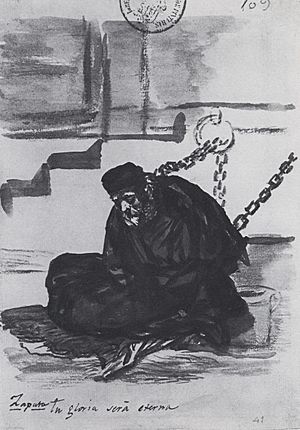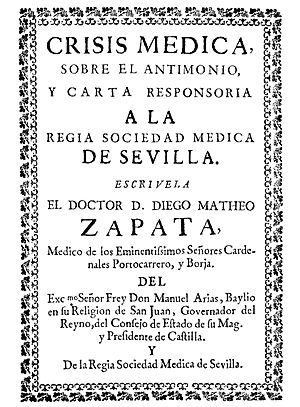Diego Mateo Zapata facts for kids

Diego Mateo Zapata (born 1664, died 1745) was an important Spanish doctor and thinker. In 1724, he faced serious challenges because his ideas and beliefs were not accepted by powerful groups at the time, including the Spanish Inquisition.
Contents
Who Was Diego Mateo Zapata?
Diego Mateo Zapata was born in Spain in 1664. He became a well-known physician, which means a doctor, and a philosopher, someone who thinks deeply about life and knowledge. He lived during a time when new scientific ideas were starting to become popular, but older ways of thinking were still very strong.
What Were His Beliefs?
Zapata was known for his modern ideas, especially in medicine. He believed in using reason and observation to understand how the body works and how to treat illnesses. This was different from many doctors of his time who relied more on ancient texts or superstitions. He also had beliefs that were linked to Judaism, which was not accepted by the powerful Spanish Inquisition in Spain during that period.
Challenges He Faced
Because of his different ideas, Zapata faced difficulties. In 1724, he was reported to the Spanish Inquisition, a powerful religious court. This was a very serious situation for anyone whose beliefs were seen as going against the official teachings of the church.
His Important Writings
Diego Mateo Zapata wrote several books and papers about medicine and philosophy. These writings showed his advanced thinking for his time.
- True Defense of Rational Philosophical Medicine (1690): This book argued for a more logical and scientific approach to medicine.
- Medical Crisis on Antimony (1701): This work discussed a specific medical substance and its uses.
- Preface to a translation of Nicolas Lemery's Course of Chemistry (1721): Zapata helped introduce new ideas about chemistry to Spanish readers.
- Dissertation on Medicine and Theology (1733): This book explored how medical knowledge and religious beliefs could connect.
- Decline of Aristotelian Forms (1745): In this work, Zapata challenged older philosophical ideas from Aristotle, showing his support for newer ways of thinking.
Legacy of Diego Mateo Zapata
Diego Mateo Zapata's work helped to bring new scientific and philosophical ideas to Spain. Even though he faced challenges, his writings contributed to the growth of modern medicine and rational thought in his country. He is remembered as a brave thinker who stood by his beliefs.
See also
In Spanish: Diego Mateo Zapata para niños
 | William M. Jackson |
 | Juan E. Gilbert |
 | Neil deGrasse Tyson |


